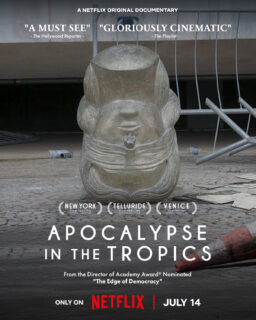After the release of his “Standard Operating Procedure,” the director Errol Morris writes me: This movie seems to have incited controversy, almost as if I broke some sort of rule or series of rules. The ultimate mystery is people. They are often mysteries not only to others but to themselves. Almost everyone wants to dismiss the bad apples rather than look at them, as if there is nothing inherently interesting in their stories. Oh well. The words “to themselves” hold the key.
None of the opinions in the film are owned by Morris. They belong to the people on the screen, who actually appear in the infamous photographs from Abu Ghraib. There are a few very brief off-screen questions by Morris (“That was on your birthday?”) but they’re not penetrating, do not suggest opinions, are the sorts of things any attentive listener would say. Most of the reviews of the film get this right. Sampling the reviews linked by IMDb.com, I found little to disagree with. I assume the “controversy” Morris refers to involves message boards, questions at film festivals, people walking up to him in the street, editorial page bleats, talk radio, those sorts of things.
But listen to the words in the screen. The people in the photographs are as puzzled as we are. They did things they might not have done under other circumstances, and yet were blindsided by this particular set of circumstances. The wisest statement in the film (however obvious) is by the prison guard Javel Davis, who says, “Pictures only show you a fraction of a second. You don’t see forward and you don’t see backward. You don’t see outside the frame.” You don’t see why these Americans enlisted in the military or the National Guard, you don’t see their training, you don’t see their experiences, you don’t see how Iraq changed them. They seem to wonder about these things themselves. We look at old photos of ourselves and wonder why we ever wore that shirt, or combed our hair that way. When did I stop using Brylcreem? Why was I that person? Still more does Lynndie England wonder how, at 20, she found herself in photographs from Abu Ghraib, pointing to a man forced (not by herself) to masturbate.
I’m not sure I agree with Morris that the Americans in the photos are even “bad apples.” The one who does deserve that description seems to be Charles Graner (not allowed to be interviewed for the movie), who England believes deceived and manipulated her, and held the camera for a lot of the photos, and instructed the others in their poses. The others may not have been bad apples but good ones left to spoil too long in the sun of the war in Iraq.
Morris is correct; there is no rule that says he may not simply listen to them speaking. His chief occupation has always been to listen. Perhaps that’s why Robert McNamara choose to be interviewed by him; you might think McNamara would go instead for someone like Ken Burns. In his Oscar-winning “The Fog of War: Eleven Lessons from the Life of Robert S. McNamara” (2003), Morris freely used montages and newsreel footage and all sorts of visual material to illustrate McNamara’s words, but McNamara didn’t squawk, and I think the visuals were fair enough. In “SOP,” on the other hand, although Morris does use some reenactments, all his visuals are based on what might have been seen in that place, at that time.
There is a tradition for films, especially documentaries, that propose merely to look and listen. That seems to be the case with Robert Flaherty’s “Nanook of the North.” On the other hand, no one would think of Leni Riefenstahl’s “Triumph of the Will” as merely looking and listening. We now know, however, that “Nanook” was largely scripted, the locations were constructed, and the film represented a distillation of Flaherty’s ideas about the Inuit people. No less was “Triumph” a distillation of Riefenstahl’s ideas about the Third Reich, staged and filmed with the resources of the Reich at her disposal. The idea of a purely objective documentary is largely a fantasy, but “SOP” is objective in that it shows these people questioning their own lives and behavior, and offers no answers.
“The ultimate mystery is people,” Morris writes. Yes. That helps explain a kind of film I instinctively admire: A film that examines human behavior in minute detail and infinite curiosity, and offers no conventional story structure to “explain” it. Consider “The Son” (“L'Enfant,” 2002), the Cannes winner by the Dardennes brothers. Why is this carpenter instantly so fascinated by the apprentice who has been brought into his shop? Why does he leap onto a cabinet to get a better look at him? Why does he care? The young man has certainly never seen him before. It is their shared mystery that fascinates me, not anything else. And the mystery of Abu Ghraib. And the mysteries that fascinate McNamara, such as that some of the bombing raids against Japan that he participated in might have been considered war crimes if the Japanese had won. Why do we do the things that we do? Must we? Do we have a choice? There is no answer, but the question itself asserts our nature as human beings.











